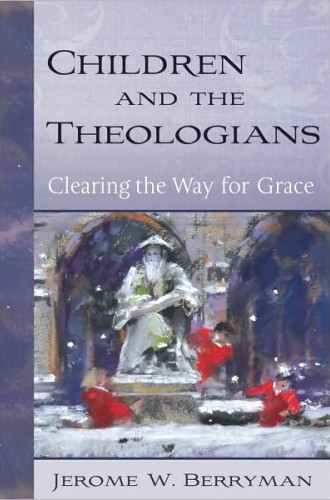Doctrine of children
In the conclusion to his account of the role of children in theology and the church, Jerome Berryman recalls the words of a girl who had seen him walk by on his way to the sacristy before a worship service. The girl's mother reported her words: "There goes the man who is always glad to see me."
Berryman knows a great deal about theology and about child psychology, but what permeates his life and his writing is a disposition that "suffers the little children" in ways that are profoundly creative for them and deeply prophetic for the church. Toward the end of a career most celebrated for producing the catechetical program Godly Play—one of the Holy Spirit's greatest gifts to the contemporary church—Berryman lays out the theological foundations for his deepest convictions.
Read our latest issue or browse back issues.
He does so in characteristic style. The book is laid out as a story that is bursting with incidental detail, riveting insight, quirky circumstance and personal anecdote. Like most stories, it starts with a problem. The problem is that the gifts children bring to the church and that the church can bring to children are inhibited because adults underestimate children's capacity to experience God and reflect on that experience. What is at work is what Berryman calls a de facto doctrine of children—one that "holds an ambivalent, ambiguous, and indifferent view of children with a hint of grace."
Noting that no major systematic theologian has taken up the doctrine of children, Berryman embarks on a chronological journey through the work of 29 theologians, from the first century to the 21st, whom he sees as significant in shaping the church's informal doctrine of children—even though some have almost nothing specifically to say about children.
This extended survey digs up a number of truffles. Jean Gerson, the 15th-century chancellor of the University of Paris, gave over his later life to teaching children in Lyons. The 16th-century catechist Robert Bellarmine transformed his discipline by being the first to put the catechetical questions in the mouths of children rather than adults. The 17th-century Jesuit and Ursuline missionaries among the Huron Indians in French Canada practiced a level of corporal punishment that looked to the Huron like incomprehensible brutality; the missionaries perceived a conflict between loving children and loving God that the Huron couldn't comprehend. Berryman picks up these insights and ironies beautifully. Each chapter opens with very appropriate reproductions of works of art accompanied by commentaries that are helpfully interwoven with the narrative. This is evidently a work of love.
The survey format has this weakness: it doesn't dwell on the sharp theological divides in a way that might make it easier to identify key points. Augustine gets a length of treatment similar to that of most of the other figures, although surely his shadow stretches farther than almost any other figure. I could imagine a portrayal of the early centuries that, for example, sets Augustine's commitment to original sin in contrast to Irenaeus's understanding that suffering and evil arise fundamentally from immaturity, then pursues the consequences of that profound difference in relation to the doctrine of children. Theological insights of this sort permeate the book but don't structure the argument as much as they might.
Berryman highlights the fact that in his survey of theologians, no women appear until the 21st century—at which point they become the majority. To what extent a more even distribution across gender might have altered the church's historical understanding of children is a large question, and a familiar one in the sense that it is a question for all aspects of doctrine and church life. But it remains a difficult question to answer. The heroes of Berryman's historical survey are Nicholas of Cusa, Martin Luther, Friedrich Schleiermacher, Horace Bushnell, Karl Rahner and Rowan Williams.
It isn't until late in the book that we get a definition of what childhood is—the period between acquisition of language and the onset of puberty. This comes in one of the most impressive sections, where Berryman lays out no less than eight kinds of ambiguity about children—notably whether children are sinful or sinless and whether they are a trouble or a blessing. Again the comprehensiveness is compelling but dilutes the constructive argument.
When it finally comes, Berryman's proposal is that children be seen as a means of grace. But three qualifiers need to be attached to this attractive statement. First, Berryman has his own definition of grace. For him, grace is not so much about approval, mercy and pardon as about charm and loveliness and the ability to form relationships in ways that transcend awkwardness. It is about art and beauty more than about law and punishment. Grace is fundamentally constructive creativity.
Second, Berryman regards children as sacraments and carefully elucidates how each of the seven sacraments could be enhanced by greater sensitivity to the role and significance of children. Those who are troubled by the church's longstanding debate over the precise number and nature of the sacraments may not warm to the discussion being reignited here.
Third, Berryman has a universalistic impulse in his thinking that inclines him to leap from "children can" to "all children are." This is a subtle but significant jump. I have known children who were very much a means of grace. But I have also known children in whom, however much they were listened to, grace was much more difficult to perceive—however grace was defined. Berryman's argument doesn't seem to allow for such diversity. To be fair to him, however, Jesus' recorded statements about children suggest a view that makes no distinctions concerning grace. So he's in good company.
Currently the academy—and in some places the church—is much more attuned to difference in the form of gender, race and class than it is to tender or advanced age or to variations in mental ability. One day children will be given a true doctrinal account that grants them an honored place in the scroll of creation, incarnation, salvation, Spirit and church. And when that day comes and theologians and believers look back to models of how the work of a practitioner can be folded into the reflection of a scholar, then, if not before, the gracious work of Jerome Berryman will finally receive the acclaim it deserves.







